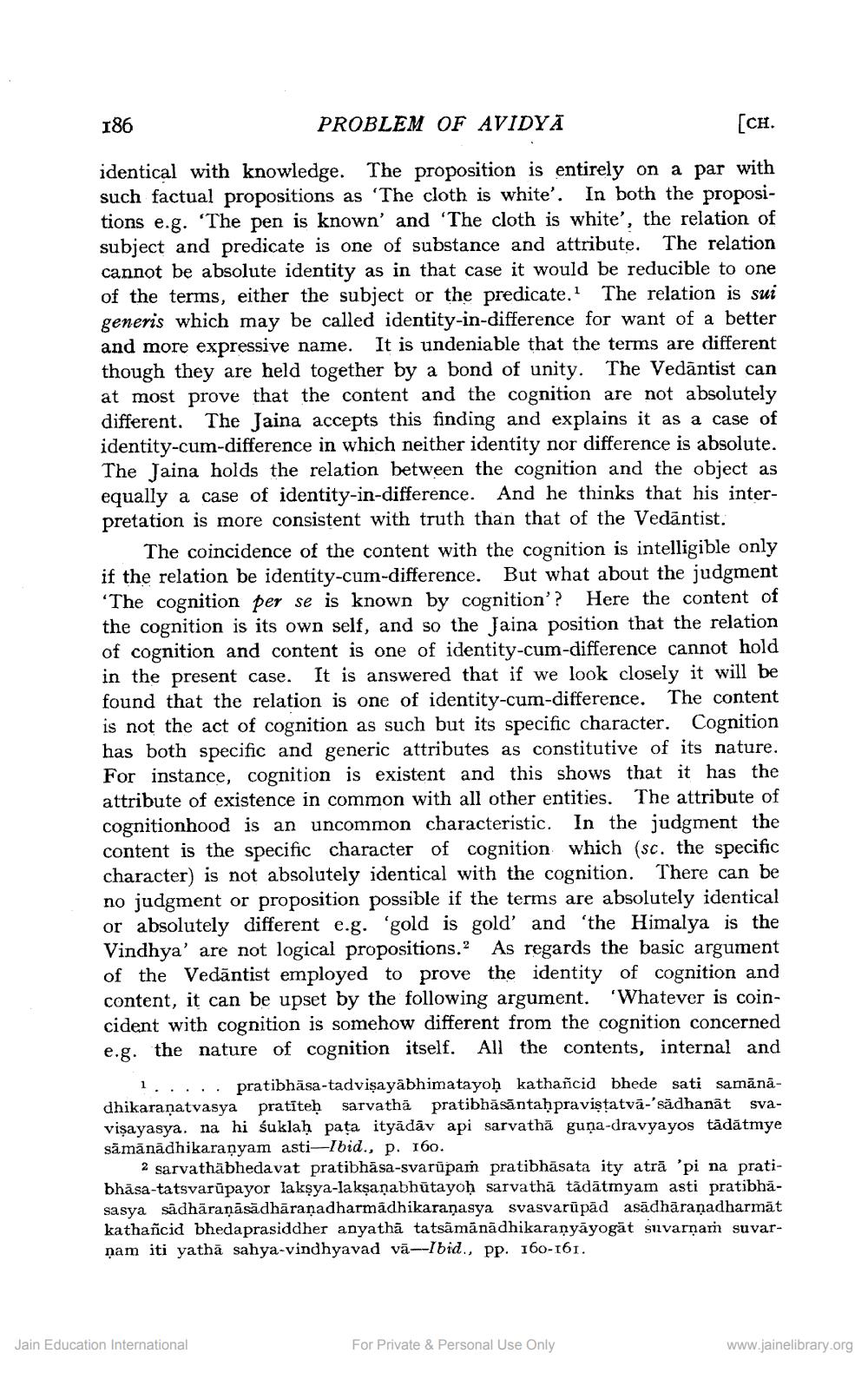________________
186
PROBLEM OF AVIDYA
[CH.
identical with knowledge. The proposition is entirely on a par with such factual propositions as 'The cloth is white'. In both the propositions e.g. 'The pen is known' and 'The cloth is white', the relation of subject and predicate is one of substance and attribute. The relation cannot be absolute identity as in that case it would be reducible to one of the terms, either the subject or the predicate. The relation is sui generis which may be called identity-in-difference for want of a better and more expressive name. It is undeniable that the terms are different though they are held together by a bond of unity. The Vedāntist can at most prove that the content and the cognition are not absolutely different. The Jaina accepts this finding and explains it as a case of identity-cum-difference in which neither identity nor difference is absolute.
Jaina holds the relation between the cognition and the object as equally a case of identity-in-difference. And he thinks that his interpretation is more consistent with truth than that of the Vedāntist.
The coincidence of the content with the cognition is intelligible only if the relation be identity-cum-difference. But what about the judgment 'The cognition per se is known by cognition'? Here the content of the cognition is its own self, and so the Jaina position that the relation of cognition and content is one of identity-cum-difference cannot hold in the present case. It is answered that if we look closely it will be found that the relation is one of identity-cum-difference. The content is not the act of cognition as such but its specific character. Cognition has both specific and generic attributes as constitutive of its nature. For instance, cognition is existent and this shows that it has the attribute of existence in common with all other entities. The attribute of cognitionhood is an uncommon characteristic. In the judgment the content is the specific character of cognition which (sc. the specific character) is not absolutely identical with the cognition. There can be no judgment or proposition possible if the terms are absolutely identical or absolutely different e.g. 'gold is gold' and 'the Himalya is the Vindhya' are not logical propositions. As regards the basic argument of the Vedāntist employed to prove the identity of cognition and content, it can be upset by the following argument. Whatever is coincident with cognition is somehow different from the cognition concerned e.g. the nature of cognition itself. All the contents, internal and
1..... pratibhāsa-tadvişayabhimatayoḥ kathañcid bhede sati samānadhikaraṇatvasya pratiteḥ sarvathā pratibhāsāntaḥpravistatvá-'sadhanãt svavisayasya. na hi suklah pata ityādāv api sarvathā guņa-dravyayos tādātmye sāmānādhikaraṇyam asti-Ibid., p. 160.
2 sarvathābhedavat pratibhāsa-svarūpam pratibhāsata ity atrā 'pi na pratibhāsa-tatsvarūpayor lakşya-lakṣaṇabhūtayoḥ sarvathā tādātmyam asti pratibhāsasya sadhāraņāsādhāraṇadharmadhikaranasya svasvarūpād asādhāraṇadharmāt kathañcid bhedaprasiddher anyathā tatsāmānādhikaranyāyogāt suvarnar suvarņam iti yathā sahya-vindhyavad vā--Ibid., pp. 160-161.
Jain Education International
For Private & Personal Use Only
www.jainelibrary.org




